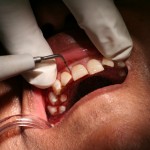
The aim of this study was to evaluate the efficacy of a slow release doxycycline gel (SRD) administered as an adjunct to non-surgical therapy in subjects with recurrent or persistent periodontitis but acceptable oral hygiene during supportive periodontal care.
What did they do
Patients suffering from persistent or recurrent moderate to severe periodontitis and undergoing regular maintenance care were randomized to either ;mechanical ultrasonic/sonic instrumentation (USI) and subsequent administration of SRD or USI alone. Full supportive periodontal care follow ups were performed every 3 months for a period of 1 year. Clinical and microbiological re-examinations as well as sonic/ultrasonic instrumentation of all sites with PPD ≥4 mm. were performed at 3, 6 and 12 months after treatment. The main outcome was absolute change of probing pocket depth (PPD) reduction in bleeding on probing (BOP), treatment time, microbiological parameters (reported separately) change of probing attachment level (PAL), and need for retreatment were secondary outcomes.
What did they find
- At 3 months:-
- the test group showed a significantly higher decrease in mean probing depth than the control group
- at 3 months (mean difference = 0.11 mm, 95% CI 0.03–0.19 mm, p = 0.003).
- Administration of SRD resulted in significantly greater odds of transition of bleeding pockets ≥5 mm to a category of non bleeding sites with PPD ≤4 mm at 3 and 6 months(O.R. = 1.4, 95% CI 1.2–1.8 at 3 months).
- At 6 months:-
- SRD benefit was observed only in the deeper pockets.
- 7.5% of subjects (no significant difference between test and control) showed disease progression (attachment loss ≥2 mm) and were exited from the study.
- At 12 months there was no difference between the two groups.
- No difference in the incidence of adverse events was observed between groups
They concluded
The results of this trial support the concept that SRD may provide short-term benefit in controlling inflammation and deep pockets in treated periodontal patients participating in a secondary prevention programme and able to maintain a satisfactory level of oral hygiene.
Tonetti MS, Lang NP, Cortellini P, Suvan JE, Eickholz P, Fourmousis I, Topoll H, Vangsted T, Wallkamm B. Effects of a single topical doxycycline administration adjunctive to mechanical debridement in patients with persistent/recurrent periodontitis but acceptable oral hygiene during supportive periodontal therapy. J Clin Periodontol. 2012 May;39(5):475-82. doi: 10.1111/j.1600-051X.2012.01864.x.Epub 2012 Mar 19. PubMed PMID: 22429128.
Related review
A systematic review by Sgolastra et al in 2011 included three randomised trials looking at the use of SRD as an adjunct to scaling and root planing (SRP) the follow up period for these studies was only 9 months. The reviews conclusion was, ‘The meta-analysis results seemed to support the long-term effectiveness of adjunctive SDD therapy; however, future studies are needed to confirm these findings’.
The current study failed to show a benefit at 12months
Sgolastra F, Petrucci A, Gatto R, Giannoni M, Monaco A. Long-term efficacy of subantimicrobial-dose doxycycline as an adjunctive treatment to scaling and root planing: a systematic review and meta-analysis. J Periodontol. 2011 Nov;82(11):1570-81. doi: 10.1902/jop.2011.110026. Epub 2011 Mar 21. Review. PubMed PMID: 21417590.

-how can we determine the quantity of gel for particular dose in disease condition for perfect treatment ?